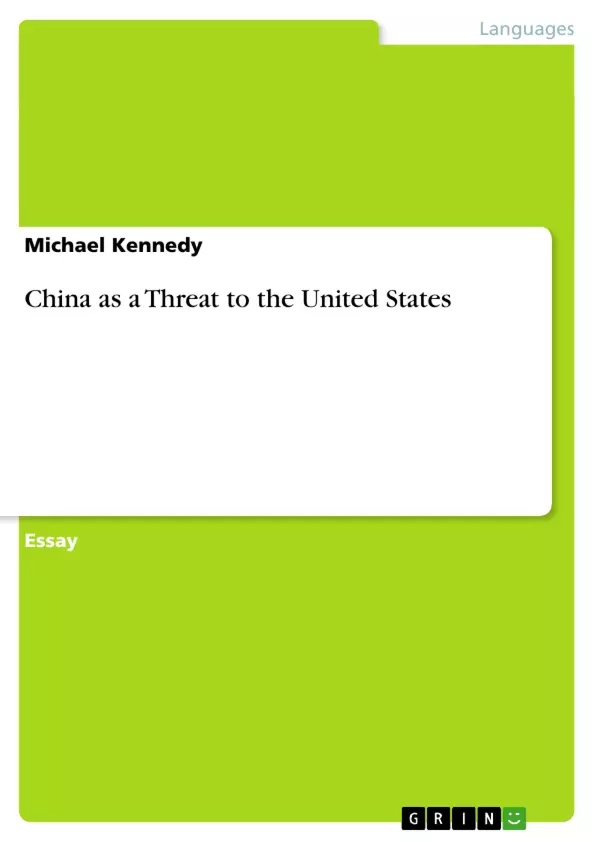There are many conflicting arguments both for and against the statement that China is a threat to the United States. As some would argue, China’s rapid economic expansion and its growing influence on the world stage in contrast to the United States’ relative decline is a threat to U.S. security as a hegemonic role. However, this is not the case and although China may have more influence over the United States than ever before, China’s internal structure and ambition to replace the U.S. as the world hegemon is lacking. However, where a threat does exist, is the possible economic warfare that could take place between China and the United States if the U.S. were to successfully establish an Asian trade bloc that excluded China. It would be in both parties’ best interest to be mutually inclusive in the event of such a partnership.
Inhaltsverzeichnis (Table of Contents)
- China as a Threat to the United States
- China's Economic Growth and Internal Structure
- The United States' Decline and the Cost of Hegemony
- Economic Interdependence and the Possibility of Conflict
- Friedberg's Argument for Rivalry and the Importance of Economic Interdependence
- Conclusion
Zielsetzung und Themenschwerpunkte (Objectives and Key Themes)
This essay examines the argument that China poses a threat to the United States. It analyzes China's rapid economic expansion and its growing influence on the world stage, contrasting it with the United States' relative decline. The essay also explores the potential for economic warfare between the two countries and the role of economic interdependence in preventing conflict. The key themes explored in this essay include:- China's economic growth and its potential impact on U.S. hegemony
- The United States' decline and the costs of maintaining its hegemonic position
- The role of economic interdependence in maintaining peace between China and the United States
- The potential for conflict between China and the United States, given their respective power dynamics and ideological differences
- The limitations of "what if" scenarios in predicting the future of U.S.-China relations
Zusammenfassung der Kapitel (Chapter Summaries)
The essay begins by outlining the arguments both for and against the notion that China poses a threat to the United States. It highlights China's rapid economic growth, fueled by economic liberalization policies, and its increasing influence on the global stage. However, the essay argues that this growth is largely based on foreign investment, making China's economic strength vulnerable to disruptions. The essay then explores the United States' decline and the costs associated with maintaining its hegemonic position. It argues that the United States' role as a hegemon is costly and that there is insufficient evidence to suggest that any state would desire to take over this role. The essay further suggests that the United States' decline is not necessarily a threat but rather a reflection of the advancement of other states. The essay then delves into the importance of economic interdependence between China and the United States. It highlights the views of liberal optimists who believe that interconnectedness, shared international institutions, and China's democratizing nature serve as significant factors in pacifying potential conflicts between the two countries. The essay also notes the potential for economic warfare if the United States were to establish an Asian trade bloc that excluded China. Finally, the essay examines the arguments of those who are less optimistic about U.S.-China relations. It highlights the perspective that sees the relationship between the two countries as one of rivalry for power supremacy. The essay concludes by asserting that despite existing issues between the two states, China is not a threat to the United States. It emphasizes the United States' superior power and influence, the mutually beneficial nature of economic interdependence, and the argument that China's rise does not necessarily translate to greater power as a global hegemon.Schlüsselwörter (Keywords)
The key themes explored in this essay include China's economic growth, U.S. hegemony, economic interdependence, potential for conflict, and the limitations of "what if" scenarios in predicting the future of U.S.-China relations. The essay also touches upon concepts such as economic liberalization, globalization, power dynamics, and ideological differences.Frequently Asked Questions
Is China a direct threat to the United States' hegemonic role?
The article argues that while China's influence is growing, its internal structure and lack of ambition to fully replace the U.S. as a world hegemon suggest it is not a direct threat to U.S. security in that sense.
What is the role of economic interdependence between the U.S. and China?
Economic interdependence acts as a pacifying factor. Both nations benefit from trade, making conflict costly and incentivizing cooperation through international institutions.
What could trigger economic warfare between the two nations?
A potential trigger could be the establishment of an Asian trade bloc by the U.S. that successfully excludes China, leading to retaliatory economic measures.
Is the decline of the United States a sign of China's threat?
The essay suggests the U.S. decline is relative and reflects the advancement of other states rather than a specific threat from China. Maintaining a hegemonic role is also noted as being extremely costly.
Why is China's economic strength considered vulnerable?
China's growth has been heavily fueled by foreign investment, which makes its internal economic stability susceptible to global market disruptions.
- Citar trabajo
- Michael Kennedy (Autor), 2013, China as a Threat to the United States, Múnich, GRIN Verlag, https://www.grin.com/document/268264



